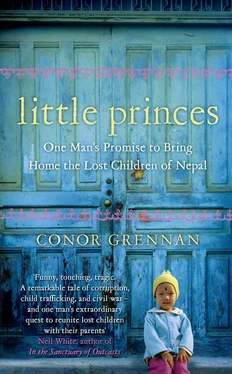Little Princes
One Man’s Promise to Bring Home the Lost Children of Nepal
Conor Grennan

Copyright
This novel is entirely a work of fiction. The names, characters and incidents portrayed in it are the work of the author’s imagination. Any resemblance to actual persons, living or dead, events or localities is entirely coincidental.
HarperCollinsPublishers Ltd.
1 London Bridge Street
London SE1 9GF
www.harpercollins.co.ukFirst published by HarperCollinsPublishers 2005
© Conor Grennan 2010
Conor Grennan asserts the moral right to be identified as the author of this work
A catalogue record of this book is available from the British Library
All rights reserved under International and Pan-American Copyright Conventions. By payment of the required fees, you have been granted the non-exclusive, non-transferable right to access and read the text of this ebook on-screen. No part of this text may be reproduced, transmitted, down-loaded, decompiled, reverse engineered, or stored in or introduced into any information storage and retrieval system, in any form or by any means, whether electronic or mechanical, now known or hereinafter invented, without the express written permission of HarperCollins ebooks
HarperCollins Publishers has made every reasonable effort to ensure that any picture content and written content in this ebook has been included or removed in accordance with the contractual and technological constraints in operation at the time of publication
Source ISBN: 9780007354160
Ebook Edition © 2011 ISBN: 9780007354191
Version: 2018-06-14
For Lizzie
Contents
Cover
Title Page Little Princes One Man’s Promise to Bring Home the Lost Children of Nepal Conor Grennan
Copyright
A Note on the Crisis in Nepal
Prologue
Part I: THE LITTLE PRINCES
Chapter One
Part II: AROUND THE WORLD AND BACK
Chapter Two
Part III: SEVEN NEEDLES IN A HAYSTACK
Chapter Three
Chapter Four
Part IV: INTO THE MOUNTAINS
Chapter Five
Part V: LIZ
Chapter Six
Chapter Seven
Chapter Eight
Photographic Insert
Afterword
Acknowledgments
About Next Generation Nepal
About the Publisher
A Note on the Crisis in Nepal
THE DECADE-LONG CIVIL WAR in Nepal (1996–2006) claimed more than thirteen thousand lives. The devastating economic consequences destroyed hundreds of thousands more lives in one of the poorest countries in the world.
In the remote regions of the country, the Maoist rebels, who had taken up arms against the king, used intimidation and murder to control villages. They abducted children, forcing them to join the rebel army in the fight against the royal government.
Child traffickers, preying on villagers’ fears of Maoist abductions, deceived families by promising to take their children to the safety of the Kathmandu Valley, one of the few regions left in Nepal that was still free from Maoist control. For this “service,” they collected vast sums from impoverished families. The traffickers then abandoned the children in Kathmandu, hundreds of miles from their mountain villages. These children, who could be as young as three years old, effectively became orphans.
There are tens of thousands of children still missing in Nepal.
Prologue
December 20, 2006
IT WAS WELL AFTER nightfall when I realized we had gone the wrong way. The village I had been looking for was somewhere up the mountain. In my condition, it would be several hours’ walk up a rocky trail, if we could even find the trail in the pitch-dark. My two porters and I had been walking for thirteen hours straight. Winter at night in the mountains of northwestern Nepal is bitterly cold, and we had no shelter. Two of our three flashlights had burned out. Worse, we were deep in a Maoist rebel stronghold, not far from where a colleague had been kidnapped almost exactly one year before. I would have shared this fact with my porters, but we were unable to communicate; I spoke only a few words of the local dialect.
Exhausted, I slumped down beside them. I zipped up my jacket and knotted my arms tightly around my chest to keep out the cold. Six days had passed since I split from my team. I had sent them home, back to their villages, promising them that I would be okay. My guide, Rinjin, tried to stay with me. Just to make sure the helicopter comes, he had said. I assured him everything would be fine and pushed him to leave with the others. The trek back to their villages would take the men several days, and they had been away from their families for almost three weeks. Rinjin had taken a last look at the empty sky, shaken his head at my stubbornness, and clasped my hand in farewell. Then he hurried to catch up with the others already descending the trail.
I reached into my bag, looking for food. I pushed aside the weather-beaten folder, crammed with my handwritten notes and photos of young children, children who had been taken from these mountains years before. The notes had been my only clues to finding their families in remote villages accessible only by foot.
Behind a crumpled, rain-stained map, my hand touched two tangerines—the last of our food. I passed them to the two porters.
I wondered how things would have been different if I hadn’t gotten hurt. Or if I hadn’t split from my team, or if I hadn’t decided to wait on that mountain for a helicopter that never came. It didn’t matter now. What did matter was figuring out how we would get through the night.
Part I
THE LITTLE PRINCES
November 2004—January 2005
Конец ознакомительного фрагмента.
Текст предоставлен ООО «ЛитРес».
Прочитайте эту книгу целиком, купив полную легальную версию на ЛитРес.
Безопасно оплатить книгу можно банковской картой Visa, MasterCard, Maestro, со счета мобильного телефона, с платежного терминала, в салоне МТС или Связной, через PayPal, WebMoney, Яндекс.Деньги, QIWI Кошелек, бонусными картами или другим удобным Вам способом.













